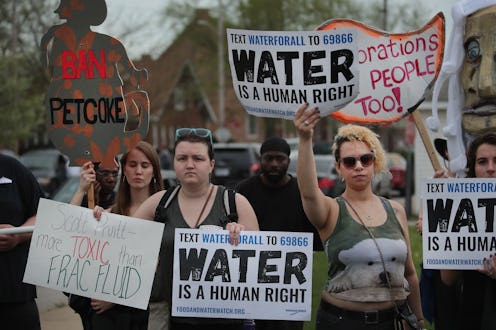Life
Why Earth Day 2017 Is More Important Than Ever

Every spring on April 22, the modern environmental movement is recognized with a global day of action, demonstrations, and celebrations, otherwise known as Earth Day. Now in its 47th year, it is clear why Earth Day 2017 is more important than ever.
When I was a kid, I remember coming to school every April and spending an entire week learning about and celebrating Earth Day activities. We planted trees, picked up trash around town, learned about the three Rs — Reduce, Reuse, Recycle — and made our annual promise to be kinder to the planet. Even now, years later, I remember how powerful that experience was, how every year, without fail, I got so worked up about protecting the planet, I would spent my time lecturing my family about cleaner living, writing letters to my local representatives about saving the animals, and donating my chore money to environmental organizations that made a difference.
This year, I'm celebrating Earth Day as an adult, and while I still hold tight to those old traditions, I have a deeper understanding of why it's so crucial everyone, not just school children, get involved in the global movement to protect the planet. It's more than just a holiday about planting trees and cleaning out your public park. It's a vital event that has the possibility to inspire serious change in government policies and cultural attitudes about the Earth.
If you're still unsure of whether or not the event matters, here are seven reasons why Earth Day 2017 is important, now more than ever.
1Science Is Being Seriously Threatened
Let's start with the facts: Global climate change is real, and human activity has played a big part in it. While it may seem like an obvious and undeniable fact to some, to others — including many members of the current administration and the head of the EPA himself — it isn't a matter of importance, let alone fact. Policy makers and government agencies in Washington are at risk of losing funding, facing censorship, or being dismantled all together. The truth is, science is under attack.
That's why, this Earth Day, protesters are taking to the streets and demanding their voices, and, more importantly, their facts be heard during the March for Science on April 22. More than ever, 2017 is the year everyone needs to stand behind the women and men in the scientific community and the work they do. Their research is crucial, and it just might be able to save us.
2Air Pollution Is Increasing, Thanks To Global Warming
While it is true that there has been some serious progress in decreasing air pollution over the past four decades, air quality is continually threatened by global climate change. According to the National Resource Defense Council, a New York-based non-for-profit international environmental advocacy group, global warming has increased the production of allergenic air pollutants including mold and pollen, which lowers air quality across the board. In addition, common, human-caused air pollution including carbon dioxide and methane gas continue to threaten the overall health of the planet, and the health of the human beings living on it.
3Clean Water Isn't A Guarantee
As we've learning in recent years with the ongoing water crisis in Flint, Michigan, clean water is not a guarantee, even in the United States. Enough said.
4Extinction Levels Are At An All-Time High
According to the World Wildlife Federation, extinction rates are at least 100 to 1,000 percent higher than nature intended, and it's because of humans. Just in the last 40 years alone, there as been a 52 percent decrease of vertebrate species in the wild. In 2016, the Bramble Car melomys, a small Australian rodent, the Irrawaddy dolphin, and two subspecies of Javan Rhinos became extinct. It's predicted that, in 2017, the sixth mass extinction will continue, and we will lose even more animals, thanks to poaching, pollution, disease, and agricultural expansion.
5Deforestation Is Causing Increased Greenhouse Gas Emissions
We often talk about human-caused climate change in terms of pollution and greenhouse gases, but did you know that deforestation is also a major cause of increased emissions? According to Conservation International, 11 percent of all global, human-caused greenhouse gas emissions is a result of deforestation. That number is comparable to the amount of emissions caused by all of the cars and trucks in the world.
6Garbage Is Piling Up Around The Globe
There's no denying it: The world is facing a trash crisis. According to the World Bank's Social, Urban, Rural, and Resilience Global Practice, people generate 1.3 billion tons of waste every year, but that number is only increasing. By 2100, it is expected to reach four billion. The United States is among the leading trash generators, along with China, Brazil, Japan, and Germany, and according to official agencies, the build up of waste we cause is not only a threat to the environment, but to human health, safety, and finances, as well as the very social fabric of our individual cultures.
7The World's Human Population Is At Serious Risk
Putting aside the very serious, very grave problems facing the world's oceans, forests, and animals, there's one other reason Earth Day 2017 is crucial this year: Human lives are at risk. According to Conservation International, 11 percent of the world's population are vulnerable to the negative effects of climate change. That means nearly 800 million people are threatened by droughts, floods, heat waves, extreme weather events, sea-level rise, and other major, human-caused problems that could seriously harm human communities as well as wildlife.
Earth Day 2017 isn't just about recycling and picking up trash. It's about saving the world, and saving ourselves.